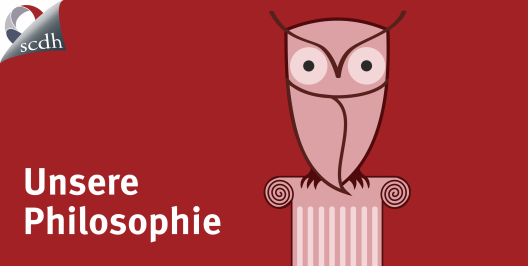


Our Philosophy
In order to be able to professionally accompany and advance the digital transformation of the humanities at the University of Münster, we at the SCDH are committed to the following principles in our work:
- Openness
The SCDH is dedicated to advancing research in the humanities at University of Münster by supporting researchers to develop and implement a digital perspective on their research projects. In consultations, we first try to find a "common language" so that we can successfully exchange ideas about the subject-specific and digital approach to the project. We are committed to the principles of Open Science: We want to contribute to the free and fair exchange of information and knowledge as much as possible in order to promote intersubjective comprehensibility and the reproducibility of research results. In our opinion, mutual learning and understanding is indispensable in order to concretely unlock the potentials of the digital transformation of the humanities and to use them profitably. This is not about collectivizing intellectual property, but about opening up methods and data. The focus remains on scientific exchange.
- Confidentiality
All discussions, your materials and data will be kept strictly confidential. Accordingly, no internals of working groups are revealed, but only the methodological workflows, processes and results are made transparent and comprehensible in the sense of the principle of openness. The actual scholarly work and the individual authorship and contribution remain protected, of course. Documentation is provided in the Library's internal project management system. Sample and result data that you entrust to us for piloting or further processing will of course continue to belong to your working group and will be protected by us from unauthorized access. At the same time, we would be pleased if you also decided to opt for Open Access in your projects and would be happy to inform you about the possibilities. If your request concerns aspects of the German Data Protection Regulation (DSGVO), we will jointly prepare appropriate preliminary considerations for handling personal data and will be happy to refer you to specialists in this area at the University of Münster.
- Quality
The Digital Humanities are an academic field that is continuously and rapidly renewing itself. We aim to be always up to date in consulting and development. Since the founding of the SCDH, the team has therefore been attending workshops and conferences to stay informed in the fast-moving field and to be able to actively participate. For quality assurance in the field of research software engineering, we follow community standards for sustainable research software. In addition, we promote and maintain the competencies of research software engineers. In this, we also see a contribution to the practical recognition of these important activities at the University of Münster and to the creation of incentives for the development of high-quality research software in the humanities.
High quality is always ensured by the enabling for critical evaluation and reflection of DH methods. For this, it is not always necessary that researchers become programmers. The engagement with algorithmic methods, data processing and digital workflows can rather be seen from the perspective of different levels of abstraction. At the highest level, the program code of a digital tool is a black box, but the tool can still be applied. For the critique of a digital method, a deeper insight into the processes of the components involved is necessary, for example on the basis of the documentation of a digital tool or standards. It is only in the layers below that the structure and programming of the components play a role. Here, for example, the aspects of performance or IT security are involved. In accompanying the acquisition of competencies for aspiring and advanced digital humanists, we would like to promote the exploration of the various levels of abstraction.
- Sustainability
The SCDH is committed to the Data First Principle. This means that, as far as possible, data is modeled according to established standards and stored in open formats that ensure long-term accessibility and reusability. (Visual) representations that access web services or databases via open interfaces are given the status of a proof of concept and thus represent one of many possible perspectives on the research data collected. Wherever possible, data is published in accordance with the FAIR principles. This includes, for example, the assignment of a Digital Object Identifier (DOI) to ensure permanent citability, availability and dissemination of metadata to other reference tools such as search engines and catalogs.
- Continuity
The SCDH regards advising researchers and research groups as a process and strives for long-term collaboration. This means, for example, continuous consulting from an initial orientation meeting to support in the preparation of a third-party funding proposal or the training of staff as well as the consolidation of results. Accordingly, you can develop the maximum potential of our service if you involve us as early as possible in the planning process. In this way, higher-level concepts and generic procedures can be generated, which work synergistically in the network of the many competencies brought in and are tailored precisely to the needs of the researchers.

